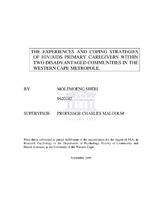| dc.contributor.advisor | Malcolm, Charles | |
| dc.contributor.author | Shebi, Molemoeng | |
| dc.contributor.other | Dept. of Psychology | |
| dc.contributor.other | Faculty of Community and Health Sciences | |
| dc.date.accessioned | 2013-09-27T09:03:17Z | |
| dc.date.available | 2008/05/15 10:11 | |
| dc.date.available | 2008/05/15 | |
| dc.date.available | 2013-09-27T09:03:17Z | |
| dc.date.issued | 2006 | |
| dc.identifier.uri | http://hdl.handle.net/11394/2158 | |
| dc.description | Magister Artium (Psychology) - MA(Psych) | en_US |
| dc.description.abstract | The Human Immuno-deficiency Virus (HIV) that leads to Acquired Immuno-Deficiency Syndrome (AIDS) is considered to be spreading at a high rate in South Africa. Research indicates that this disease is highly prevalent among people 15 and 49. It is estimated that one in five adults in South Africa is HIV positive. Community or home-based care nurses manage the treatment of sufferers at their homes while under the care of their family members, friends, spouses and significant others. The present study explored the experiences and coping strategies of HIV/AIDS primary caregivers. | en_US |
| dc.language.iso | en | en_US |
| dc.publisher | University of the Western Cape | en_US |
| dc.subject | HIV Care | en_US |
| dc.subject | South Africa | en_US |
| dc.subject | AIDS (Disease) Care | en_US |
| dc.subject | Home-based family services | en_US |
| dc.subject | Caregivers | en_US |
| dc.title | The experiences and coping strategies of HIV/AIDS primary caregivers within two disadvantaged communities in the Western Cape metropole | en_US |
| dc.type | Thesis | en_US |
| dc.rights.holder | University of the Western Cape | en_US |
| dc.description.country | South Africa | |

